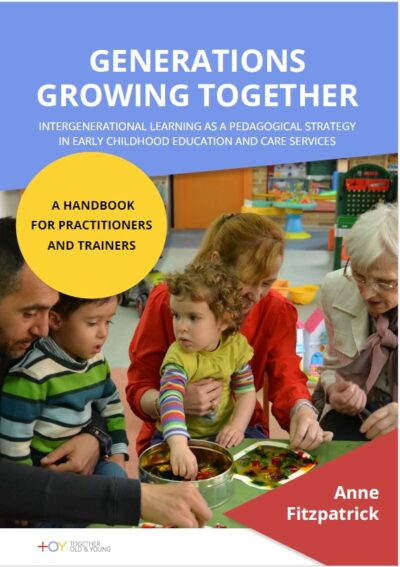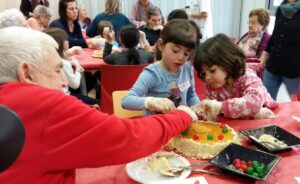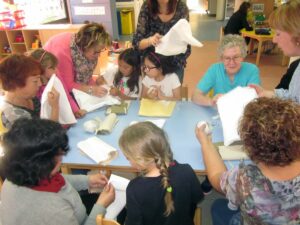Blog
Generations Growing Together: New Handbook on IGL in ECEC

Generations Growing Together: New handbook on implementing intergenerational learning in early childhood education and care (ECEC) services now launched. To get a taster read this blog by its author, Dr Anne Fitzpatrick.
Are you an early childhood educator interested in developing IGL in your service or are you looking for a new initiative to extend the learning possibilities for children in your ECEC service?
If so, the Generations Growing Together handbook will serve as a roadmap to support you and your staff group along every step of the way in introducing, planning, implementing and evaluating sustainable IGL in your ECEC service. Trainers will also find it useful as a teaching tool to introduce the theory and practice of IGL to ECEC students and other interested students and practitioners.

The Handbook reflects the latest research on IGL and young children, and this, combined with lessons learned from educators experienced in implementing IGL in their ECEC services, is its key strength. It is structured so that users can dip in and out, depending on their needs. For example, if IGL is new to the user, they may wish to start with the sections on the concept and benefits of IGL and how it fits with ECEC theory and policy. Educators already implementing IGL may be more interested in the sections providing a bank of ideas and guidance on how to evaluate their IGL practice. Each section presents an overview of the topic, as well as reflective questions and signposts to additional resources.
Generations Growing Together opens with an overview of IGL and its benefits for young children, older adults, educators and families. The next section focuses on the key role of the educator, which has been found to be crucial in the successful implementation of IGL. Educators implementing IGL are knowledgeable, flexible and visionary acknowledging children and older adults as both learners and teachers. Important values and attitudes required of the educator in implementing IGL are outlined in detail, as well as essential skills and competences.
 Three very practical sections on planning, implementing and evaluating IGL practice follow. Key steps in the planning process are outlined including how principles of IGL align with international curricular frameworks. This is followed by an overview of tried and tested experiences and materials used by educators in implementing IGL successfully in ECEC services.
Three very practical sections on planning, implementing and evaluating IGL practice follow. Key steps in the planning process are outlined including how principles of IGL align with international curricular frameworks. This is followed by an overview of tried and tested experiences and materials used by educators in implementing IGL successfully in ECEC services.
IGL initiatives must be of high quality if they are to have benefit, so evaluating is an essential process in identifying what does and does not work. What to evaluate and with whom is considered and useful techniques for evaluating with children, educators and parents are presented. While research findings on IGL with young children are overwhelmingly positive, the handbook outlines some possible challenges and how they might be addressed.
Generations Growing Together also raises some important philosophical questions about learning priorities for young children. A list of further readings and resources that will support the user in developing their IGL practice is also included.
Contact: anne.fitzpatrick@TUDublin.ie
Dr. Anne Fitzpatrick is a founding member of the ‘Together Old and Young’ (TOY) consortium (2012-18), which promotes intergenerational learning between young children and older people. As part of the TOY project, she participated in the development of the TOY online course on intergenerational learning. Intergenerational learning as a pedagogical strategy in Irish ECEC services was the focus of Anne’s doctoral studies. She previously worked as a lecturer in early childhood education at the Technological University Dublin and also worked in a variety of ECEC services in both the community and disability sectors.